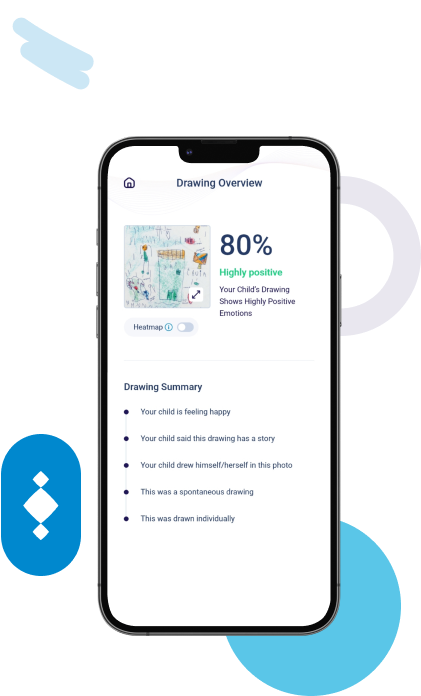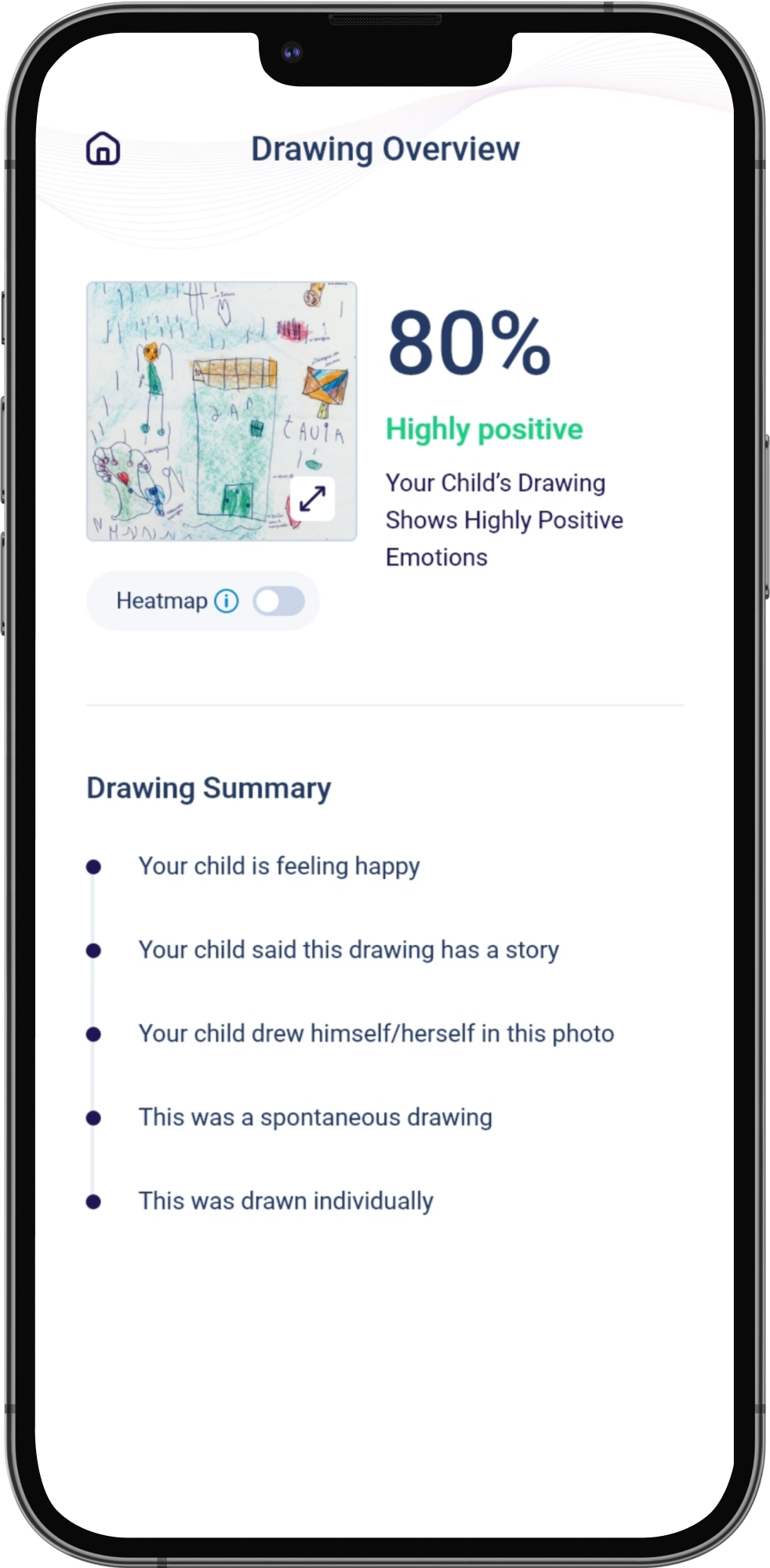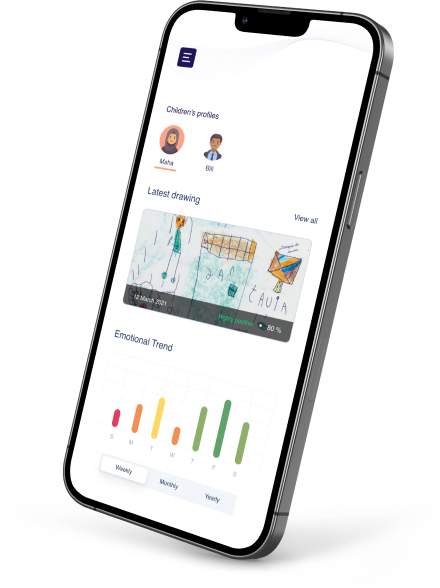











About the ESRA App
ESRA is a groundbreaking app that utilizes advanced AI algorithms to assess the emotional state of children between the ages of 5 to 10 years old through their creative artwork. Unlike any other app on the market, ESRA automates the art therapy task conducted by professionals to monitor children's mental health. The app uses state-of-the-art deep learning based Dense Net Model to estimate the emotional status of children based on their drawings, with an accuracy of 84%. The app provides labels (positive and negative) as well as probabilities of labels that are translated into the proportion of the image to belong to a certain class.

Prof. Mowafa Said Househ
Founder
Prof. Mowafa Said Househ (موفق سعيد حوسة), PhD, is a full professor of health informatics in the Arab World and is associated with the Hamad Bin Khalifa University, College of Science and Engineering, at the Qatar Foundation.
His research interests include the use of information and communication technologies in healthcare, with a particular focus on Artificial Intelligence Technologies to support public health and improve healthcare literacy. He has a strong interest in the field of digital mental health, aiming to use technology to benefit both patients and healthcare professionals.
In 2020, Prof. Househ was the recipient of first place in the United Nations ITU Artificial Intelligence Challenge. His work has also been recognized with the Researcher Award from the King Abdullah International Medical Research Centre in 2015, the MBC Hope Awards for Innovation and Social Entrepreneurship in 2015, and as a finalist for the Massachusetts Institute of Technology Arab Enterprise Forum competition in 2014. Additional recognitions include the Young Researcher Award in 2010, the Northern British Columbia Healthcare in Technology Award in 2007, and the Michael Smith Foundation for Health Research Trainee Award in 2003.
Prof. Househ also holds the position of adjunct Associate Professor at the University of Victoria's School of Health Information Science in Victoria, BC, Canada. With a scholarly contribution of over 300 research papers and more than 14 books, Prof. Househ's work in health informatics has been influential in both the academic realm and practical application, impacting healthcare practices in the Arab world and internationally.
Scopus: https://www.scopus.com/authid/detail.uri?authorId=8667908000

Download
Install the application available on the Google play store and iOS app store

Add Child
Create a profile for your child to track all their art works

Evaluate
Upload or capture your child's artwork to have our machine learning model evaluate it
Features
ESRA provides an innovative way for parents to connect with their child through art. By tracking and analyzing your child's emotions through their artwork, you can gain a deeper understanding of their thoughts and feelings, leading to more meaningful conversations and shared experiences.
-
Evaluate drawings
ESRA allows parents to easily save and organize their child's artwork in a digital format, preserving the memories and milestones of their child's artistic journey.
-
Contact art therapists
ESRA provides parents with the option to share their child's visual mental health emotions with a mental health practitioner, who can provide guidance and support in managing their child's emotional wellbeing.
-
Track feelings
ESRA helps parents create a visual diary of their child's emotional journey, allowing them to look back on the memories and milestones of their childhood with fondness.

-
Track emotions
By using AI technology to analyze your child's artwork, ESRA can detect and track your child's emotions over time. This valuable insight can help parents better understand their child's emotional state and identify any potential concerns.
-
Wear your emotions
Parents have the option to have their child's artworks printed on a product such as t-shirts, hats, cups, or a canvass.
-
Track moods
By using AI technology to analyze your child's artwork, ESRA can provide valuable insights and statistics about your child's emotional state, allowing you to make informed decisions about their emotional wellbeing.
AWARDS
Awards and Accolades - ESRA's Innovative Technology Receives Recognition on a Regional and Global Scale!
ESRA's College of Science and Engineering Team Takes the Middle East and Africa by Storm - Wins Top Prize in ITU AI4Dev Challenge!"
https://www.hbku.edu.qa/en/news/cse-team-winsESRA's Cutting-Edge Technology Takes Center Stage at Weill Cornell Medicine Qatar's Medical Humanities Conference 2022!
https://qatar-weill.cornell.edu/event/medical-humanities-in-the-middle-east/speakers/profile/mowafa-said-househESRA Takes the Spotlight on Qatar TV - A Groundbreaking Tool for Enhancing Children's Emotional Wellbeing!
https://www.youtube.com/watch?v=Xd0Z1V7ae5c
ESRA showcased at HBKU 10th Year Anniversary Celebration
ESRA was showcased at the HBKU Showcase in celebration of the university's 10th year anniversary, where it received widespread attention and recognition for its innovative approach to emotional screening and promoting family literacy through art.
2022 HBKU Innovation Grant Award
ESRA is proud to have been awarded the prestigious 2022 Innovation Grant from Hamad Bin Khalifa University. The grant recognizes ESRA's groundbreaking technology and its potential to revolutionize the way parents connect with and understand their children.
ESRA's innovative approach to emotion sensing and recognition, combined with its easy-to-use mobile app interface, impressed the judges and made it a standout choice for the grant. The grant will provide ESRA with the resources it needs to further develop its technology and expand its reach to more parents and families around the world.
ESRA is honored to have received this recognition from Hamad Bin Khalifa University and is committed to continuing its mission to promote better emotional wellbeing and stronger parent-child relationships through the power of art and technology.
RESEARCH
ESRA: Making Waves in Emotional Wellbeing - Three Groundbreaking Papers Published!
ESRA is proud to have published three papers on its innovative technology and its potential to revolutionize the way parents connect with and understand their children. These papers showcase the cutting-edge research and development that has gone into ESRA, making it a standout choice for parents looking to enhance their child's emotional wellbeing.
The first paper, "ESRA-Towards Explicability," published in QScience Connect 2022, no. 3, highlights ESRA's commitment to transparency and explicability in its AI technology. This paper demonstrates how ESRA has built an AI system that can detect and analyze emotions in children's drawings with high accuracy and provides clear explanations to parents about how the system works.
The second paper, "Artificial intelligence-based mobile application for sensing children emotion through drawings," published in Studies in health technology and informatics 295, showcases ESRA's mobile app interface and its ability to detect and analyze emotions in children's drawings in real-time. This paper demonstrates how ESRA can be used as a powerful tool for parents to track and analyze their child's emotional development over time.

The third paper, "Art Therapy and Beyond: Emerging Practice Innovations and Implications for Practice and Research in the Arabian Gulf," published in QScience Connect 2022, no. 3, highlights the potential of ESRA to revolutionize the practice of art therapy in the Arabian Gulf. This paper demonstrates how ESRA can be used as a powerful tool for art therapists to enhance their practice and improve the emotional wellbeing of their clients.
Overall, these papers demonstrate ESRA's commitment to innovation and its potential to make a positive impact on the emotional wellbeing of children and families around the world. By using cutting-edge AI technology to detect and analyze emotions in children's drawings, ESRA is helping parents to better understand and connect with their children on a deeper emotional level.
Links to the Publications:
Art Therapy and Beyond: Emerging Practice Innovations and Implications for Practice and Research in the Arabian Gulf OAESRA - Towards Explicability Artifical Inteligence-Based Mobile Application for sensing childern emotion through drawingsFrequently asked questions
What does a Positive or Negative score mean?
ESRA is an Artificial Intelligence (A.I.) based system that can quantify the negative or positive emotions of a drawing with an accuracy of 84%. Negative and positive emotions can coexist in one drawing and a higher positive score means there are more positive emotions expressed in the drawing than negative emotions. The same is true for negative emotions.
Should I be worried about negative results?
No, ESRA is an A.I. based system and is not a replacement for professional advice. However, if you find a consistent level of negative emotions in the drawings over time, we suggest that you speak with your child or seek professional counseling. Always refer to your local and trusted healthcare professionals for further guidance and support.
How accurate are your results?
Currently, the A.I. model used by ESRA has an accuracy rate of 84%. We anticipate that as more users share their images and are analyzed by ESRA’s art therapists, the accuracy of ESRA will improve over time. The involvement of a qualified art therapist in the supervision of both algorithm design and evaluation enables quality assurance for this pre-assessment tool.
What can ESRA help and not help with?
ESRA can help to analyze the drawing of your children and provide you with a score of the positive or negative emotions present in the drawing. The analysis is based on “art therapy” methods. However, ESRA will not replace the need for a professional art therapist or a psychologist. This platform does not provide any medical advice and can only suggest that users seek professional counseling.
How will my responses or comments be used?
Your responses or comments will be anonymous and will be used to improve ESRA’s ability to better analyze the drawings and ways to enhance your experience. The symbolic and observational data gathered by concerned parents will be documented (notes, journals, sketching).
Does ESRA provide any advice or resources for the parents to access in case the child appears to be showing predominantly negative emotions?
No, ESRA does not provide any medical advice or resources. The platform will not replace the need for a professional art therapist or psychologist and will only suggest that users seek advanced and professional medical help if needed.
Why should families use ESRA app?
The ESRA app enables families to encourage creativity, interpretation, and possibly help start a conversation with a school counselor or psychologist.
Who is the target audience for this platform?
At this time, the target audience is parents. The purpose of the app is for it to be used as a monitoring tool for children through their drawings. Instructions to perform the scan of the art away from the child’s view will enhance the dialogical process by enabling parents to pause and practice inquiry-based questions aside from the ESRA’s binary processing of the image. Rather than extracting expected responses from their child, this dynamic promotes open communication and can enhance emotional literacy and creativity within families.
Why is your feedback important?
Your feedback is important to improve the accuracy of our algorithm. After taking an image, if you click on the dismiss button, a window will pop up asking you to provide feedback for dismissing the image. Kindly take a few seconds to let us know about why you disagree with the results of the output provided to you by ESRA.








